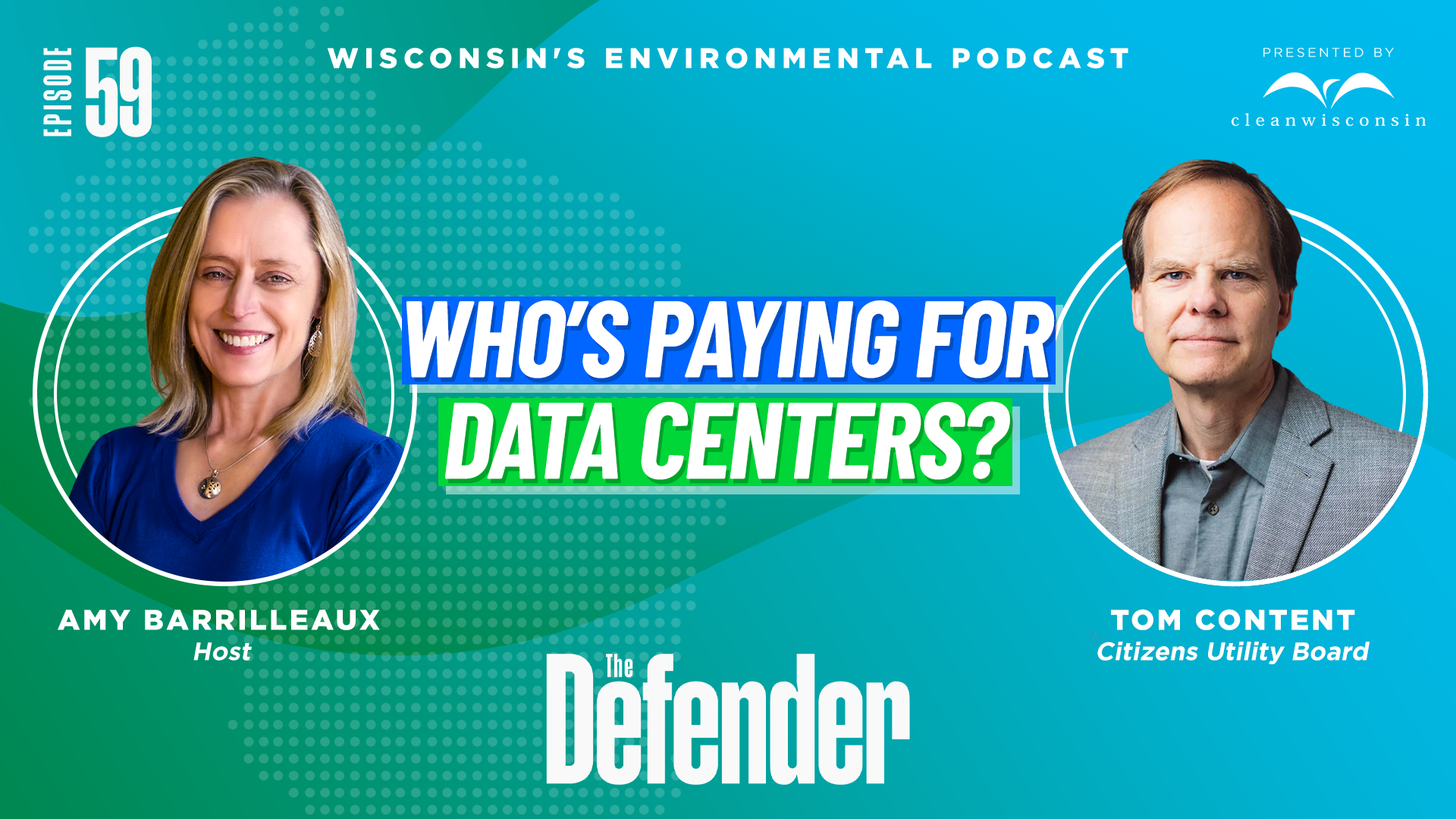Where to Listen:
You may have heard, Wisconsin needs more power and we need it fast. In the next few years, AI data centers will cause an unprecedented surge in energy demand across our state. There are already large expensive new powerplants being built to help meet that demand with more to come. But the big question is, will Wisconsinites be left shouldering part of the cost?
In this episode, the shocking energy needs of AI, why our power companies are rolling out the red carpet, and the lasting environmental and economic harms that could be left in the wake.
Host:
Amy Barrilleaux
Guest:
Tom Content, Citizens Utility Board of Wisconsin
Resources for You:
Citizens Utility Board Data Centers Page
Petition: Take A Stand Against Unchecked Data Center Development
New Analysis: Data Center Water Consumption Will Be Far Higher Than Tech Companies Claim
PSC approves plan to power AI data center with gas plants
Transcript:
Amy Welcome to the Defender, Wisconsin’s Environmental Podcast. I’m Amy Barrilleaux. The Defender is powered by Clean Wisconsin, your environmental voice since nineteen seventy. You may have heard Wisconsin needs more power and we need it fast. In the next few years, AI data centers will cause an unprecedented surge in energy demand across our state. There are already large, expensive new power plants being built to help meet that demand with likely more to come. But the big question is, will Wisconsinites be left shouldering the cost?
Tom And frankly, the We Energies’ rate plan is to have the tech companies pick up three fourths of the cost. Now that may seem good, but one fourth of five point six billion is a lot of money. It’s still over a billion and a half for projects that wouldn’t be built if we didn’t have all this growth that was tied to data centers.
Amy In this episode, the shocking energy needs of AI, why our power companies are rolling out the red carpet, and the lasting environmental and economic harms that could be left in the wake. That’s right now on the Defender. Wisconsin is seeing a number of harmful new gas plants being built, a delayed coal plant retirement, even talk about a nuclear reactor being constructed, all to meet skyrocketing energy demand from AI data centers. The environmental harms could be lasting, and all that construction will come with a huge price tag that Wisconsinites could end up helping to pay. In fact, we already are. Joining me is Tom Content from the Consumer Protection Nonprofit Citizens Utility Board, or CUB for short. Thank you for being here.
Tom Thank you.
Amy Before we dive into AI and data centers, explain what the Citizens Utility Board is, what it does.
Tom Sure. So we are the designated residential and small business customer advocate for all the utility customers in Wisconsin. So and we were founded first pub in the country founded back in 1979 to kind of level the playing field at the Public Service Commission where utilities have a lot of a lot of sway and industrial big business was having a lot of sway. And so there was no voice for residential customers. And so it was Ralph Nader’s vision to create Cubs and Wisconsin was the first state to take them up on his idea. And now we are actually the statutory in statute, the designated consumer advocate for all homeowners, renters, and small businesses. So we’re there to make sure that there’s balance between the customers paying the bills and the utility shareholders who can and utilities kind of the the profit seeking part of the utilities where they they want to make make more money than they need to off the backs of customers, unfortunately.
Amy Your background was in journalism, right? You covered our state’s utilities as a journalist. What is the kind of carryover now when you’re looking at the state’s utilities as an advocate?
Tom It’s pretty similar. I mean, when I first moved to Wisconsin I was handed a press release when I was at the Green Bay Press Gazette and they said, you know, here’s a press release from the utility WPS. Read it, but make sure you call Cub, get the other side. You know, it’s like, don’t believe everything you see in the in press releases, call the other side. And so that’s what that’s what Cub is. I mean, I went from reporting for the people to now representing the people to try to make sure that there’s that we have a fulsome dis display of transparency and and representation and that that when when utilities say something that they that we make sure that they back it up with data. If they want things approved by the regulator, the regulator of the monopoly utilities, they have to prove it. And so we’re there to poke holes in their arguments and make sure that whatever the state approves is has been fully vetted. And I know Clean Wisconsin is very active in some of those proceedings as well but but that’s that’s been CUB’s role for 45 years.
Amy You talk about having to dig deeper beyond the press release, for example, that might come from a utility to make sure that consumers are protected. We’ve been seeing a lot of press releases lately from energy utilities, from tech companies. What is the concern? Basically we’re hearing, well, yeah, all this energy is is gonna be used, but we can handle it. You know, the utilities are saying we can handle building this new power generation. Right. No problem. And we’re also hearing, well, we can you know, pay our own way from the tech companies. It’s not gonna impact consumers at all. So we’re hearing good things. Everything’s fine, I think, is what we’re hearing. What what is your concern with that?
Tom Yeah, I think they’re saying the right things, but the devil’s in the details. So and that’s one of the reasons why we’re so active in the national group, our National Association of Consumer Advocates. Because we’re hearing the same things about, oh, we’re gonna pay our fair share, or customers won’t have to bear these additional costs. But but the lived experience in other states is that customers are in other states are having to shoulder some of these costs. It’s a problem that resulted in, you know, rising utility prices and energy prices playing out in election results last week in Georgia, Virginia, and New Jersey. And so and we point to a Harvard study that came out this year that showed unfortunately, despite those assurances, that the the proof and the putting so far has been in st in certain states like Louisiana is a is a prime example where the tech companies are being subsidized by the homeowners and renters of Louisiana. So I think that’s where we have these cases now that are that are actually analyzing what the utilities have proposed in terms of the cost structure. And we want to make sure it that whatever they it that ends up getting decided by the Public Service Commission has the most consumer protections possible and really puts the tech companies and the utilities, especially the tech companies, money where their mouth is in terms of having assurances, in terms of financial guarantees that that ratepayers won’t be stuck if business plans suddenly change with this ever-evolving AI race that they’re in.
Amy You talk about business plans suddenly changing. You were a reporter back in the day when Wii Energies got its Power the Future coal plant passed through the Public Service Commission. And that coal plant past around the time that coal started to become kind of like a a thing of the past, right? A thing that energy utilities were moving away from and it became clear that this very, very expensive project was going to be something that people were gonna be paying for long after it was shut down. So is there a concern, you know, from your perspective, having kind of seen this play out, this, we’re gonna build this big thing and then maybe in ten or fifteen years, oh, we don’t need this big thing anymore. Is there a concern that we might see that play out again? That we’re gonna build all this energy stuff, not just the power plants, but also the transformers and the substations and all that to accommodate this huge energy demand of data centers. And then maybe in 10 years, you know, we don’t really know what’s gonna be needed.
Tom Exactly. I mean I think I think we’ve seen it play out where, you know, utilities are s utility customers are still paying and the utility is still profiting from a coal plant that’s already been dismantled in in the Kenosha County in Pleasant Prairie. And in the case of, you know, their new coal plant the newer coal plant in o and Oak Creek, it was designed to be built for coal and then they had to redesign it to accommodate a less expensive kind of coal and now they’re redesigning it again so that it can burn natural gas in instead. When business plans change in the private sector and people say, Oh, I guess we should have done it a different way, that company’s on the hook. And in this case, we’re on the hook as the customers of the utility because of the regulated monopoly utility. So the concern is real that we could end up with the state could approve multiple power plants that end up being far more than the state needs. And and I think, you know, people talk about the fact that every AI search that uses about 10 times as much energy as as a Google search, and then just factor that on. The scale of the amount, the number of new power plants that’s being proposed, plus transmission lines. Really orders of magnitude different. It’s and just in the case of Port Washington and Racine, We Energies’ largest customer today is a steel mill. And this is like putting thirty, thirty-five of those steel mills in Port Washington and 18 more of those steel mills in Racine in Mount Pleasant on the Fox site. The two the two projects together would use up as much energy as all of Wii Energy’s customers all across the state used last year. So it’s this is this is game changing, frankly. And the risk of we weren’t talking about data centers three years ago. What are we going to be talking about three years from now? I think there’s there’s a lot of concern about an AI bubble in the in the business press right now. And so I think some caution and some like stick to our knitting in terms of fundamentals of regulating our monopolies is really in order here.
Amy So that’s what you said is pretty stunning, I would say. We Energies is looking at I’m gonna guess a pretty big windfall then from seeing its largest customer kinda like multiplied many, many times over in just one to two projects. Correct. Is this something where it’s like, you know, dollar signs driving utilities?
Tom Well that I that’s been that’s been an issue with utilities from day one. And and it’s exacerbated now. So The utility business model is such that the more they build, the more they earn. The more they build, the more they earn. And without a statewide planning process, we have a an incentive system that’s just built to incentivize utilities to build, build, build. And so what have they done in the last few weeks? They’ve announced 11 new projects to build, you know, whether it’s natural gas, whether it’s solar, whether it’s battery, a lot of new natural gas. It’s 11 new projects that are all billed. How much how much does does saving energy through energy efficiency, how much does demand response get get considered in any of these projec any of these projects, they’ll say We we could do demand response, but it’ll give us this much, but our power need is this much. And that’s why other states, you know, red states, blue states, states like Georgia, states like North Carolina, states like Minnesota. No matter what stripe they are, they they have most states have a a statewide planning process that kind of gives the PSC a holistic view on this. And on the profit side, I mean the the utilities they have a fiduciary responsibility to their shareholders, no question. And so that’s why we’re there to say, okay, but the customers have to pay the bills. You’ve already profited so much off of Power the Future and other initiatives over the years. And now you want to extract even higher profit from from the tech companies. The incentive structures, as the saying in journalism was, may that got famous in all the president’s men. Follow the money. And there’s a there’s a lot of money to be made here and utilities aren’t being shy about trying to do that.
Amy I think maybe it’s surprising s for some folks to learn that energy companies like We Energies, like Alliant Energy are actively working to lure data centers here and It’s a little tricky because we expect our utilities to be acting in the public interest, right? To be, you know, this is all infrastructure and power generation that we’re all supposed to be sharing. But at what point does it cross the line to this this cannot be in the public interest if we’re looking at, you know, according to Clean Wisconsin’s most recent analysis, one gigawatt data center equals the energy needs of a million homes, you know? So at what point is it not okay for We Energies or Alliant Energy or any of these other power companies to actively try to bring in large users so that they can build more things?
Tom I mean, I think that’s the crux of the question is what how much can can we do both, right? Can we have economic development and make sure that customers are protected along the way? And I think structurally we have some challenges because some states, like I I’m out in the Pacific Northwest at our consumer advocates meeting in Oregon passed a bill that kind of set the a let a law that actually set the rules of the road for data centers to come in. And Minnesota this summer did the same thing. And we don’t have kind of a statewide framework for that. Our legislature has passed tax credits to lure data centers, and then the utilities respond to that to that by saying, here’s a site, here’s a site, come here. And so I think we we are at a point where we we need, as we testified last week in the legislature, we need kind of a statewide framework that will help set the guardrails and and the guideposts that allow it to happen, but not allow it to happen without without accommodating the needs of of the people paying the bills.
Amy And so I have a question. It’s a little weedy, but it’s something that occurred to me today. So we’re seeing companies like Wii Energies saying, and and of course Vantage, the tech company that’s gonna be building a data center in Port Washington, saying, Well, we’re gonna, you know, the tech companies are gonna pay their own way. They’re gonna pay for all the infrastructure related to powering the data center and Vantage is saying, and by the way, it’s gonna be a lot of clean energy, a lot of wind and solar that’s gonna power the data center. It feels a little bit like a shell game. So let’s say Vantage pays the bill, so to speak, for a bunch of wind and solar energy, which is pretty cheap compared to other types of energy generation. And then We Energies says, well, for our other customers, we’re going to build a new nuclear power plant in Kewaunee, for example, which is very expensive, far more expensive than wind and solar. Then then that cost gets I mean, it’s kind of like who’s deciding which energy is going to what and who’s paying for what? So if if We Energies says, yep, Vantage, all of our wind and solar energy that’s going to you. Hey, customer, that very expensive nuclear energy, that’s going to you. And then how do you guarantee that people aren’t stuck with the the big bill from the nuclear power plant when Vantage is getting to say it’s using clean energy over here and you know, don’t look at that nuclear power plant that had to be built to meet everybody else’s needs. Does that make sense?
Tom It it makes sense. I mean, how how this gets paid for is is so critical and the fact is the tech companies, a lot of them do are trying to meet their own carbon commitments and to to meet those carbon commitments they’re embracing nuclear. So Google is actually investing in reopening the nuclear plant in Iowa. Microsoft is investing in reopening the part of Three Mile Island in Pennsylvania that didn’t melt down. And so If we’re going to be doing nuclear, which is the most expensive way to meet our energy needs, it better be that the tech companies shouldering that and not not you and me, because the costs are extreme. There’s a study that comes out every year on the costs of different technologies. And I’ll just on the one side, there there are least it’s least cost technologies and solar and wind, even without the tax credits, because now the tax credits are going away, solar and wind still are the most competitive competitive technologies. And nuclear is on the other side. We saw it in Georgia with a plant that got built there with our overruns. We’ve seen it with the rising cost of the plants that are proposed under the small modular reactor technology. And we’ve we can the fact that the utilities or that the legislature is considering a bill that would automatically raise prices just for the pre certification costs for new a new nuclear plant. Is illustrative of why of how uneconomic and how expensive nuclear is right now. So it really does get back to how does this all fit together between the rate plan for the data centers and all the stuff that they’re trying to build. And frankly, the We Energies’ rate plan To have the tech companies pick up three fourths of the cost. Now that may seem good, but one fourth of five point six billion is a lot of money. It’s still over a billion and a half for projects that wouldn’t be built if we didn’t have all this growth that was tied to data centers. So there’s there’s a lot of things they have to prove before the along the way before all this happens.
Amy So hold on now. You say that the plan is for tech companies to pick up three quarters of the bill, basically. I thought it was for them to pick up like a hundred percent of the bill.
Tom Okay, so that that’s that’s a good point. So there are two way two ways of thinking about it. One is they’re saying they’re gonna pay for every every electron that they’re gonna use. But if the utility has to build all these new power plants, the way the tariffs are worded for the data centers, they’re there are designated three-fourths of a of a power plant for the data center, and the remainder has to go for other customers. And so that’s what kind of where the the tough analysis gonna is gonna need to be made. Because yes, there’s some customer growth. I mean, there are other companies that are coming to Wisconsin that aren’t data centers. How much energy demand is that responsible for? And how m is it responsible for? Nearly a thousand megawatts of new of new generation after The PSC already this year approved new natural gas plants for Oak Creek, Kenosha County.
Amy So and then it this is it’s this is how it gets so complicated, right?
Tom Yeah, no, and that’s that’s why I’m glad we’re doing this because I think the more people understand this and and and can plow through some of the wonky stuff, the more public participation we can get in energy democracy.
Amy I like that term energy democracy. It doesn’t feel like much of a democracy right now when the control is so much in the hands of energy companies because they, you know, they do the modeling, they have the data, they have the certainly the money to put behind trying to push through the what they want to push through. I guess what for people listening to this who are feeling a little overwhelmed because this is so complicated, where should they start or what should they be doing right now?
Tom I mean I think I think the the key is to is to stay informed and and to get involved. I think there are gonna be public hearings on these tariff cases involving We Energies and a l and alliance contract. I think we’re seeing this we’re seeing it in the Marquette poll. The Marquette poll just came out and showed that by and large Wisconsinites are skeptical about the benefits of data centers. It’s time that we, you know, if it’s if it’s become a political issue in other states, and this isn’t blue or red. I saw an article that was a a take after the election results last week and in obviously another part of the country, but the take was Republicans and Democrats seem to agree on one thing that they all hate data centers right now. And that’s because there’s a surge of interest in the price of power. Energy rising energy bills, you know, and we’ve seen this in Wisconsin with the typical We Energy’s customers seeing bills jump by a third from just 2022 to next to this coming January. And so that’s already happening. And we already have this haves and have nots challenge in our in our economy right now, even before the data centers show up. So I think red, blue or purple, people running for office need to be thinking about the consumers and the prices they’re paying and how that could be impacted. And people people should be asking the people running for office, what do you think about these issues? What do you think? How can we how can we improve the situation? At CUB, we’re nonpartisan, independent, and we have progressives who are members, and we have libertarians who are just as skeptical. Regulated monopolies as they are of big government. And so it’s not really a party thing, it’s a it’s a cost and benefit thing. So getting involved is really key.
Amy Is there any scenario that you can see where we have data center projects coming into Wisconsin, AI data center projects, you know a gigawatt in southeastern Wisconsin, a gigawatt here, a gigawatt there, you know, where customers do not pay one cent more because of those data centers?
Tom I think it’s hard to say one cent more. I think it could be you could limit it. But the no no state’s gonna get this perfect. We saw Ohio passed a really strong tariff for one utility. And all of a sudden the demand from for data centers from that one utility went from a high number to a low number, and lo and behold, a lot of tech, a lot of data centers are being proposed for a different utility in Ohio that where that that strong protective tariff wasn’t adopted. And so that’s why that’s why there’s a value of a statewide approach. And I know the legislature’s talking about a statewide approach. And I think that that we’ve we’ve advocated for that. Minnesota’s already done that. Ohio is trying to do that now. I think that’s important. And the fact is, in some respects, we’re already paying. We have we’re not paying a ton yet, but there was a transmission line that was built specifically for the Foxconn project years ago. People from the state line to Lake Superior and the Upper Peninsula are all paying for that project. And who’s who who’s really standing to benefit? FoxConn not too much, but mainly it’s Microsoft. So it’s already happening. And we just need to, we need to really keep the keep the focus on getting this done right. We like to say that the the three most important people in state government that nobody’s ever heard of are the public service commissioners. Nationally, a group that’s trying to raise awareness about these issues is called Power Lines. And they They call them the Supreme Court justices of energy. And so the fact that egg prices are last year’s last year’s concern and electricity prices are this year’s concern really is focusing and attention on this in a way that we hope is constructive to hold hold price increases down going forward.
Amy Have you ever seen anything like this where you have people big cities and small towns, people from all sorts of political backgrounds and and thoughts who are in Wisconsin. Really upset about a thing, upset about you know, what typically is considered a good thing, right? Building and economic development, who are so united in in their concern.
Tom It it is striking to see how much this has coalesced. I just don’t think people appreciated the scale of these things as much as you know you have talked about that and I’ve talked about that. I think I think it didn’t resonate in the way that it has more recently for whatever reason. And since that’s occurred, I think that people are taking a a second look. And that’s refreshing, but it is unique to see this kind of attention being kind of zeroing in on this one topic.
Amy What happens in your mind if we don’t get this statewide plan, if we don’t start considering all these things together and their holistic impact on our bills, on our energy infrastructure, on power generation, if we just kind of keep on going as we’ve been going as these large AI data center projects come to Wisconsin?
Tom I think the statewide approach is so fundamental. But if we don’t, I think it’s gonna force the groups that are active at the PSC to really double down in each with each utility to see what their plan is and and bet them. There are some good things that could happen. I mean, it’s the funding for the state focus on energy program could increase significantly and that could in turn help a lot more people save on their energy bills. But in order to get to that, we need to make sure everything else is done right too. On on a non-energy side, there are fundamental questions about what AI is doing to the economy and what AI is doing potentially for humanity down the road. Sam Altman has has some strong statements and visions for where AI could be taking us. So there are a lot of questions. But on the energy side, I just think Wisconsin opened the door, but now it needs to, instead of just having a wide open door, it needs to really set those guard set guardrails to make sure this happens in in an efficient way that it doesn’t burden burden the people who are struggling to pay their bids.
Amy So put up a little a screen door. You open the door and then put the screen up.
Tom Yeah, right. There you go, there you go. I don’t wanna talk about the I don’t wanna talk about the barn door anymore.
Amy So many different door analogies we could use.
Tom Yeah, that’s right.
Amy Well, thank you so much for taking the time to talk with me and explain all this. I know it’s really complicated. So, I appreciate that. And you know, as we move through this tariff process, if you could come back on and kind of explain where we’re at, that would be helpful too.
Tom Oh sure. Happy to do it. And we do have a a a page with reports, news articles and key links to the cases. It’s on our website, cubWI.org/datacenters. So be sure to check that out. We’re gonna keep try to keep that as updated and fresh as we can. As a resource for people to help help wade through this and really become more actively involved in in figuring figuring all this out. Charlie Berens has kind of raised the profile of this issue. And now we all need to kind of follow his lead, I guess.
Amy Yeah, yeah, and it’s it’s an issue that’s not going away. So, I appreciate your time. Thank you so much.
Tom Thank you.
Amy And thank you for listening to the Defender Podcast. We have that link to Cubs website in the show notes. You can also find a link to Clean Wisconsin’s petition calling for a pause on data center approvals until we have a statewide plan to ensure that communities are not harmed by these massive projects. Again, that’s in the show notes or at cleanwisconsin.org. I’m Amy Barrilleaux. Talk to you later.




